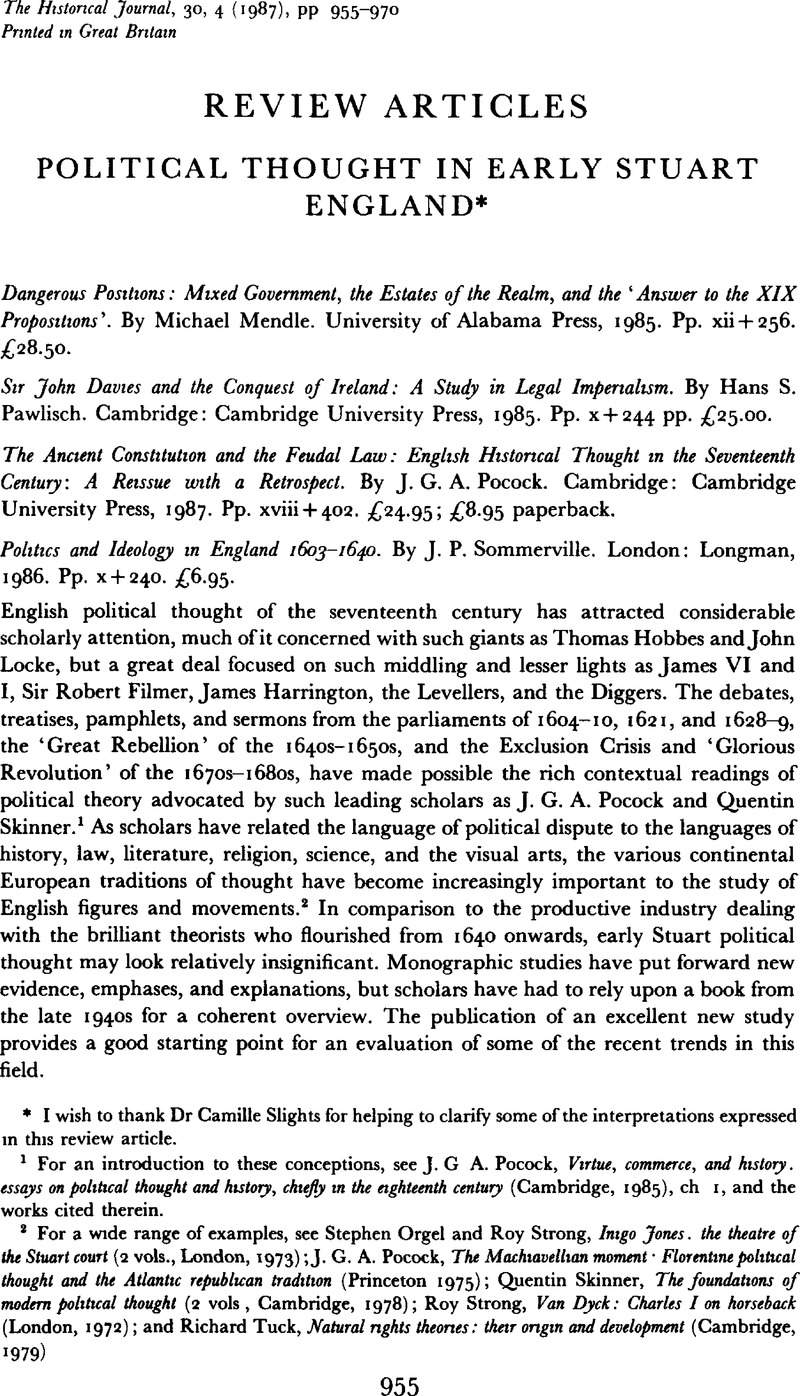Article contents
Political Thought in Early Stuart England*
Published online by Cambridge University Press: 11 February 2009
Abstract

- Type
- Review Articles
- Information
- Copyright
- Copyright © Cambridge University Press 1987
References
1 For an introduction to these conceptions, see Pocock, J. G A., Virtue, commerce, and history. essays on political thought and history, chiefly in the eighteenth century (Cambridge, 1985), ch 1, and the works cited thereinCrossRefGoogle Scholar.
2 For a wide range of examples, see Orgel, Stephen and Strong, Roy, Imgo Jones. the theatre of the Stuart court (2 vols., London, 1973)Google Scholar; Pocock, J. G. A., The Machiavellian moment Florentine political thought and the Atlantic republican tradition (Princeton 1975)Google Scholar; Skinner, Quentin, The foundations of modem political thought (2 vols, Cambridge, 1978)Google Scholar; Strong, Roy, Van Dyck: Charles I on horseback (London, 1972)Google Scholar; and Tuck, Richard, Natural rights theories: their origin and development (Cambridge, 1979)CrossRefGoogle Scholar
3 Cf. Russell, Conrad, Parliaments and English politics 1621–162;) (Oxford, 1979)CrossRefGoogle Scholar and Fletcher, Anthony, The outbreak of the English civil war (London, 1981)Google Scholar.
4 For a subtle philological exploration of the meaning of this term cited, but not always heeded by Sommerville, see Daly, James, ‘The idea of absolute monarchy in seventeenth-century England’ Historical Journal, XXI (1978), 227–50CrossRefGoogle Scholar.
5 Mcllwain, Charles Howard (ed ), The political works of James I reprinted from the edition of 1616 (Cambridge, Mass, 1918), p 309Google Scholar The convenants that God made with Noah, Abraham, Moses, and through Christ provided the starting points of the ‘covenant theology' so favoured by the early-seventeenth-century Reformed, see the classic essay by Miller, Perry, ‘The marrow of puritan divinity’ in his Errand into the wilderness (Cambridge, Mass, 1954), pp 48–98Google Scholar.
6 Pocock's book created a model into which historians could fit many of the more empirical findings in Judson's The crisis of the constitution. Compare his tone with unsympathetic, teleological discussion of political thought in Allen, J. W., English political thought 1603–1660; vol. 1. 1603–1644 (London, 1938)Google Scholar, or the unsympathetic, schoolmasterly, sometimes anachronistic intrusions in Ferguson, Arthur B., Clio unbound: perception of the social and cultural past in renaissance England (Durham, 1979)Google Scholar. The coming civil wars dominated Allen's account and his account bristles with condescending judgements; see pp. 3, 13, 96. Ferguson displays a similar disdain for the ideas of early Stuart writers; for an example, see p. 259.
7 Pocock cites most of these works in the ‘retrospect’ in addition, see Gray, Charles, ‘Reason, authority, and imagination: the jurisprudence of Sir Edward Coke’ in Zagorin, Perez (ed.), Culture and politics from puritanism to the enlightenment (Berkeley, 1980), pp. 25–66Google Scholar, and Christianson, Paul, ‘John Selden, the five knights’ case, and discretionary imprisonment in early Stuart England’ Criminal justice history, VI (1985), 65–87Google Scholar.
8 Although the ‘retrospect' refers to most of these contributions, it contains no mention of Tully, John, A discourse on property: John Locke and his adversaries (Cambridge, 1980)CrossRefGoogle Scholar; both Sommerville's, book and his essay, ‘History and theory: the Norman Conquest in early Stuart political thought’ Political Studies, XXXIV (1986), 249–61CrossRefGoogle Scholar, appeared too late for inclusion by Pocock.
9 Cf. Mendle's, book and Weston, Corrine Comstock and Greenberg, Janelle Renfrew, Subjects and sovereigns: the grand controversy over legal sovereignty in Stuart England (Cambridge, 1981)Google Scholar.
10 For some of these themes, see Sommerville, Politics and ideology, passim, and Worden, Blair ‘Classical republicanism and the puritan revolution’ in Lloyd-Jones, Hugh, Pearl, Valerie, and Worden, Blair (eds.), History and imagination: essays in honour of H. R. Trevor-Roper (London, 1981)Google Scholar; Richard Tuck kindly allowed me to read an unpublished paper which demonstrates the importance of republican theories under Oldenbarnevelt.
11 For example, see Kishlansky, Mark A., ‘The emergence of adversary politics in the Long Parliament’ Journal of Modern History, XLIV (1977), 617–40CrossRefGoogle Scholar, The rise of the new model army (Cambridge, 1979)Google Scholar, and Parliamentary selection: social and political choice in early modern England (Cambridge, 1986)Google Scholar.
12 Cf. Pocock, The ancient constitution, ch. 3, and the ‘retrospect’ pp. 282–4.
13 This appeared in Bagshaw's Lenten reading at the Middle Temple in March 1640; all of the arguments and evidence needed for his case already existed in print; see Selden, John, Titles of honor (London, 1631), p. 704. Although Bagshaw probably had partisan reasons for making the point, canon law had long forbidden clerics from shedding blood and they had absented themselves from such judgements in earlier centuries, Mendle's remark that Bagshaw's position ‘had all the menace of an irrational heads-I-win-tails-you-lose logic' makes little sense (p. 124)Google Scholar.
14 Selden, , Titles of honor (1631), p 613Google Scholar.
- 3
- Cited by




